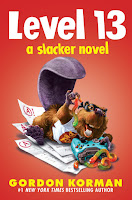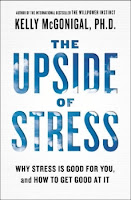

Okay! Finally, Gail is getting to a new stress mindset, described by
Kelly McGonigal in
The Upside of Stress.
Now, remember, a mindset is how we perceive something. We can perceive stress the way our ancestors did as, Oh, my gosh! I have to escape this! (Flight) Or I have to beat this impossible situation, and it's going to be horrible. (Fight)
Or...we can perceive stress as a challenge.
Threats Vs. Challenges
The fight-or-flight stress mindset is a threat response, meaning a response to danger or emergencies. Most of us aren't confronted with true dangers and emergencies on a daily basis, but our minds continue to perceive some of what's going on around us in that way. In the case of writers, we perceive a work-related stress and either run from it (to, say, the Internet and other procrastinating activities) or engage in some kind of psychological struggle to overcome the stressor. A case in point...writing
my second book was very difficult, as second books often are for writers. I can recall being up early to work on it, leaving a son off at an evening Boy Scout meeting once and going home to work some more. I would drop everything and go for a walk trying to force a
breakout experience, though I doubt I knew that term at the time. Then there was that moment I remember so fondly when I grabbed my husband by the front of his shirt and screeched, "You don't understand! I'm going to have to give back the advance!" Writing that book was definitely an ugly psychological fight.
With a challenge stress mindset, though, the primary goal is to go after what you want instead of either escaping it or using brute force to fight it. You don't feel as if you're in some kind of danger, the way you do with the threat response. You want to perform well. McGonigal says a challenge mindset can be more like pursuit of an athletic challenge than a threat. It's considered healthier for the body than the flight-or-fight stress mindset, because that is designed for short term real dangers. The human body isn't meant to live under that kind of stress indefinitely. It can manage the challenge mindset better.
Additionally,
in terms of time management, with a challenge mindset there is less desire to flee the stress, because challenges are good, right? And, thus, there's less reason to procrastinate. We should be able to work more.
Threat Vs Challenge Stress Mindsets For Writers
- In New England, this is the time of year when NESCBWI members are submitting workshop proposals for next spring's conference. Interested parties are encouraged to be prepared to teach two different workshops over the weekend, which means creating two different proposals. Depending on how you write proposals, this could mean going a long way down the road to planning two workshops. Keep in mind that while you're spending time putting together a proposal, you're not writing or submitting. What is the best use of time? Also, some writers are working on these proposals knowing that if they are accepted, they are not going to be at all comfortable teaching. I have submitted proposals twice, and taught once. The challenge mindset doesn't come naturally to me. This was a stressful experience that I now avoid. I know people who love doing this...ah...stuff, though. Perhaps they have a challenge mindset.
- At any point writers can find themselves engaged in agent hunts. In addition to finding one who will be interested in the particular project you're shopping around, you might also like to find one who represents other genres you write in. And one who might at least kind of like you. Personally, I think looking for an agent is a lot like looking for a significant other. Stressful? Or challenging?
-
And, of course, there are those points in your work when you realize the new project stinks big time and you should drop it. And marketing worries for books that sold. And what about freelance writers who actually get published regularly and often find themselves with multiple deadlines? Is all this stressful? Or challenging?
Do You Have A Threat Or A Challenge Stress Mindset?
Think about whether or not you have the skills and resources to deal with a stressful situation.
- If you believe you don't, you can end up with a threat/fight-or-flight stress response
- If you believe you do, you may go into a challenge response.
Think about the conference example I gave above. I know writers who are experienced teachers. They know they have skills and resources to handle a one- or two-hour class. Prepping for conferences and workshops may very well be more challenging than threatening for them.
Changing Your Mindset From Threat To Challenge
According to McGonigal, to shift to a challenge mindset:
- Focus on your resources. Acknowledge your personal strengths.
- Go over how you've prepared for similar challenges.
- Pray.
- Reframe stressful meetings as learning opportunities. (Learn from past mistakes?)
- Practice/train because a challenge stress mindset is like a sports challenge, which you would practice/train for.
Some Closing Questions
I definitely like the idea of thinking of stress situations as challenges instead of as...hell. But I do have some reservations.
- What if you go over your resources and have to acknowledge that you have none for a particular stressful situation? You have no personal strengths that relate to this?
- What if you haven't prepared for similar challenges in the past?
I suspect that for many people who do not naturally think in terms of challenges, the challenge stress mindset is essentially a mind game they're going to have to learn to play with themselves. And that's fine. I'm good with mind games. Getting through life is arguably one big mind game. The trick here is making this particular mind game work for you.
So...I guess if you want to face stress as a challenge, the answers to my above questions are:
- If you have no resources for a particular stressful situation, decide what resources you need to seek out. If you have no personal strengths for this, which ones do you need to develop?
- If you haven't prepared for similar challenges in the past, who has whose experience you can study?
If you'd like to read more on the science behind this subject, check out
Threat or Challenge? The Surprising New Science of How We Think About Stress at
Six Seconds. Kelly McGonigal is one of the writers the author refers to.


 Mon., Sept. 16, Jan Brett, Mystic Congregational Church, Mystic 5:00 to 7:00 PM Sponsored by Bank Street Books Ticketed event.
Mon., Sept. 16, Jan Brett, Mystic Congregational Church, Mystic 5:00 to 7:00 PM Sponsored by Bank Street Books Ticketed event.












